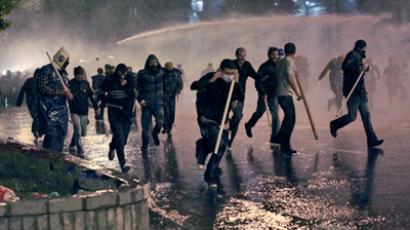Georgia says arresting journalists is not an attack on free speech

Tbilisi has denied accusations that they are undermining the freedom of the press as police detained several photographers suspected of passing classified information to a foreign spy ring.
On Friday, the Georgian President’s press-secretary Manana Mandzhgaladze said that the detention of the four photojournalists was not connected with their professional activities and thus could not be considered an infringement on the freedom of the press.“The suspects are photographers, but they are not being charged for their work as photographers. They are being charged with either passing confidential information in specific written documents or the schedule of confidential events to an organization which was previously identified as a spy network,” Mandzhgaladze said. “If they had any other occupation, the charges would still have the same qualification,” she added.Georgian police detained several photographers, including employees of the Associated Press (AP), The European Press Photo Agency (epa) and the personal photographer of President Mikhail Saakashvili late on Wednesday evening in the early hours of Thursday morning.Among the detained were Irakliy Gelenidze – the personal photographer of Georgian President Mikhail Saakashvili, his wife Natiya Gelenidze, Associated Press photographer Shakh Aivazov, Zurab Kurtsikidze who works for the European Press Photo Agency and the photographer for the Foreign Ministry’s press center Giya Abdaladze. All of the detained are Georgian citizens. Police conducted searches of their apartments, seizing their cameras and computers. According to unofficial reports, all the detained will be charged with espionage. According to initial reports, police were still interrogating the detained in the morning. On Thursday afternoon, the Georgian Interior Ministry confirmed the detention of the photojournalists, stating that the operation had been conducted by the counterintelligence department. It also reported that the detained had been charged with harming the interests of Georgia by passing sensitive information to a certain organization that is working under the cover of the intelligence agency of a foreign country, though no further information was given. The Interior Ministry also said that the AP photographer Aivazov had been released after being interrogated, though the rest of those detained remain in custody.Abdaladze’s wife told the Russian news agency Rosbalt that the police planned to charge her husband with espionage. The woman also said that the arrest was made by one investigator and several other operatives who took the photographer to the so called Module building – the place where detained dissidents and political activists are usually kept. They said that charges will formally be pressed under article 314 of the Georgian Criminal code – espionage, she said. Relatives of Zurab Kurtsikidze told the press that the police were searching his apartment throughout the night as they ultimately seized his cameras and computers.Later on Thursday, the lawyer representing one of the detained individuals, Georgiy Abaladze, told Georgian news agencies that his client was going on a hunger strike as he could not understand what the charges were against him. Another suspect, Kurtsikidze, also said he could not understand the reason behind his apprehension as all his professional activities were completely transparent, the lawyer said.On Friday, the Georgian President’s press-secretary Manana Mandzhgaladze said that the detention of the four photojournalists was not connected with their professional activities and thus could not be considered an infringement on the freedom of the press. “The suspects are photographers, but they are not being charged for their work as photographers. They are being charged with either passing confidential information in specific written documents or the schedule of confidential events to an organization which was previously identified as a spy network,” Mandzhgaladze said. “If they had any other occupation, the charges would still have the same qualification,” she added.The Georgian opposition and NGOs condemned the detention of photojournalists and demanded that they were released immediately. An NGO called The Charter of Journalists’ Ethics released a statement calling on Georgian ombudsman Georgiy Tugushi and international rights organizations to intervene. Another NGO operating under the name of The Human Rights Center demanded that the police immediately release all of those who had been detained, calling the detention of the reporters “a blatant violation of the freedom of speech”. The opposition Labor Party said through its spokeswoman that the regime was so shameless that it had started arresting photojournalists. The party also demanded that the authorities release all those who had been detained. Erosi Kitsmarioshvili, leader of the opposition “Georgian Party”, said that the authorities were clearly paranoid, and in their delusion saw conspiracies everywhere.The news about the detention of the photographers came soon after reports that a court in the Georgian town of Batumi had sentenced nine people to lengthy prison terms for spying on behalf of Russia. Four of the convicts are Russian citizens and five are Georgian. The harshest sentence was handed down to Yuri Skrylnikov, a Russian citizen, who was convicted of being a go-between for the spy group and the Russian Main Intelligence Directorate (GRU) – he was sentenced to 14 years in prison. None of the convicted individuals had plead guilty. The trial for the alleged spies started after Georgian police announced that they had managed to break a Russian spy ring by planting a mole within the group of agents. The police also said that the operation was conducted over the course of four years and that the detained suspects were passing sensitive information to the Russians about the Georgian military, including the time when the Georgian army attempted to reclaim the republic of South Ossetia and was repelled by Russian forces in August 2008. During the investigation, the suspects’ lawyers told Russian media that the only evidence against his clients was the fact that police had found phone SIM cards on them with some classified information. However, the prosecutors could not explain why all this information pieces were dissimilar. In November 2010, the Russian Interior Ministry condemned the process as a provocation aimed at disrupting Russia’s talks with NATO and the OSCE. Russia also accused Georgia of hindering the detained Russian citizens’ access to consular service clerksGeorgian opposition activists have called the spy scandal a publicity stunt intended to distract the people from the real political and economic problems in the country. Moreover, they accused the authorities of infringing on the rights of national minorities, as one of the key suspects in the case was a prominent Adzharian businessman.














